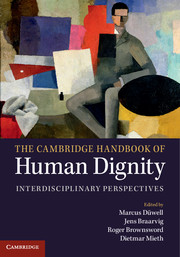Book contents
- Frontmatter
- Contents
- List of contributors
- Foreword
- Why a handbook on human dignity?
- Acknowledgments
- 1 Human dignity from a legal perspective
- 2 Human dignity: concepts, discussions, philosophical perspectives
- Part I Origins of the concept in European history
- Part II Beyond the scope of the European tradition
- Part III Systematic conceptualization
- 19 Social and cultural presuppositions for the use of the concept of human dignity
- 20 Is human dignity the ground of human rights?
- 21 Human dignity: can a historical foundation alone suffice? From Joas’ affirmative genealogy to Kierkegaard's leap of faith
- 22 Kantian perspectives on the rational basis of human dignity
- 23 Kantian dignity: a critique
- 24 Human dignity and human rights in Alan Gewirth's moral philosophy
- 25 Human dignity in the capability approach
- 26 Human dignity in Catholic thought
- 27 Jacques Maritain's personalist conception of human dignity
- 28 Scheler and human dignity
- 29 Dignity and the Other: dignity and the phenomenological tradition
- 30 Dignity, fragility, singularity in Paul Ricœur's ethics
- 31 Human dignity as universal nobility
- 32 Dignity in the ubuntu tradition
- 33 Posthuman dignity
- 34 Dignity as the right to have rights: human dignity in Hannah Arendt
- 35 Individual and collective dignity
- Part IV Legal implementation
- Part V Conflicts and violence
- Part VI Contexts of justice
- Part VII Biology and bioethics
- Appendix 1 Further reading
- Appendix 2 Universal Declaration of Human Rights
- Index
- References
34 - Dignity as the right to have rights: human dignity in Hannah Arendt
from Part III - Systematic conceptualization
Published online by Cambridge University Press: 05 March 2015
- Frontmatter
- Contents
- List of contributors
- Foreword
- Why a handbook on human dignity?
- Acknowledgments
- 1 Human dignity from a legal perspective
- 2 Human dignity: concepts, discussions, philosophical perspectives
- Part I Origins of the concept in European history
- Part II Beyond the scope of the European tradition
- Part III Systematic conceptualization
- 19 Social and cultural presuppositions for the use of the concept of human dignity
- 20 Is human dignity the ground of human rights?
- 21 Human dignity: can a historical foundation alone suffice? From Joas’ affirmative genealogy to Kierkegaard's leap of faith
- 22 Kantian perspectives on the rational basis of human dignity
- 23 Kantian dignity: a critique
- 24 Human dignity and human rights in Alan Gewirth's moral philosophy
- 25 Human dignity in the capability approach
- 26 Human dignity in Catholic thought
- 27 Jacques Maritain's personalist conception of human dignity
- 28 Scheler and human dignity
- 29 Dignity and the Other: dignity and the phenomenological tradition
- 30 Dignity, fragility, singularity in Paul Ricœur's ethics
- 31 Human dignity as universal nobility
- 32 Dignity in the ubuntu tradition
- 33 Posthuman dignity
- 34 Dignity as the right to have rights: human dignity in Hannah Arendt
- 35 Individual and collective dignity
- Part IV Legal implementation
- Part V Conflicts and violence
- Part VI Contexts of justice
- Part VII Biology and bioethics
- Appendix 1 Further reading
- Appendix 2 Universal Declaration of Human Rights
- Index
- References
Summary
In recent years, Hannah Arendt has – with increasing frequency – been interpreted as a theorist of human dignity. This frequency stands in clear contrast to the fact that Arendt herself only very rarely speaks about the dignity of human beings – in distinction, for example, from the ‘dignity of the political’ which she investigates and defends in many of her works (Villa 2000). The most prominent of the rare passages in which Arendt does speak of human dignity appears in the foreword to the first edition of The Origins of Totalitarianism (1951). Towards the end of this foreword, she writes that:
Antisemitism (and not merely the hatred of Jews), imperialism (not merely conquest), totalitarianism (not merely dictatorship) – one after the other, one more brutally than the other – have demonstrated that human dignity needs a new guarantee which can only be found in a new political principle, in a new law on earth, whose validity this time must comprehend the whole of humanity while its power must remain strictly limited, rooted in and controlled by newly defined territorial entities.
(Arendt 1958b: ix)Precisely this emphatic formulation, which links the idea of human dignity to the struggle against anti-Semitism, imperialism and totalitarianism, has, however, already ‘been dropped’ (Arendt 1986: 13) by the 1955 German edition of the book. In the major books that Arendt dedicated to the essence of the political – from The Human Condition (1958a) through On Revolution (1967) to Lectures on Kant's Political Philosophy (1982) – the question of human dignity is only addressed in passing, if indeed at all.
- Type
- Chapter
- Information
- The Cambridge Handbook of Human DignityInterdisciplinary Perspectives, pp. 332 - 342Publisher: Cambridge University PressPrint publication year: 2014
References
- 5
- Cited by

